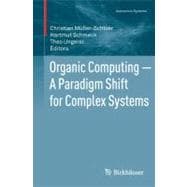
Note: Supplemental materials are not guaranteed with Rental or Used book purchases.
Purchase Benefits
Looking to rent a book? Rent Organic Computing - [ISBN: 9783034801294] for the semester, quarter, and short term or search our site for other textbooks by Muller-schloer, Christian; Schmeck, Hartmut; Ungerer, Theo. Renting a textbook can save you up to 90% from the cost of buying.
| Theoretical Foundations | |
| Adaptivity and Self-organisation in Organic Computing Systems | p. 5 |
| Quantitative Emergence | p. 39 |
| Divergence Measures as a Generalised Approach to Quantitative Emergence | p. 53 |
| Emergent Control | p. 67 |
| Constraining Self-organisation Through Corridors of Correct Behaviour: The Restore Invariant Approach | p. 79 |
| Ant Inspired Methods for Organic Computing | p. 95 |
| Organic Computing: Metaphor or Model? | p. 111 |
| Methods and Tools | |
| Model-Driven Development of Self-organising Control Applications | p. 131 |
| How to Design and Implement Self-organising Resource-Flow Systems | p. 145 |
| Monitoring and Self-awareness for Heterogeneous, Adaptive Computing Systems | p. 163 |
| Generic Emergent Computing in Chip Architectures | p. 179 |
| Multi-objective Intrinsic Evolution of Embedded Systems | p. 193 |
| Organisation-Oriented Chemical Programming | p. 207 |
| Hovering Data Clouds for Organic Computing | p. 221 |
| Learning | |
| Aspects of Learning in OC Systems | p. 237 |
| Combining Software and Hardware LCS for Lightweight On-chip Learning | p. 253 |
| Collaborative Learning by Knowledge Exchange | p. 267 |
| A Framework for Controlled Self-optimisation in Modular System Architectures | p. 281 |
| Increasing Learning Speed by Imitation in Multi-robot Societies | p. 295 |
| Learning to Look at Humans | p. 309 |
| Architectures | |
| Observation and Control of Organic Systems | p. 325 |
| Organic Computing Middleware for Ubiquitous Environments | p. 339 |
| DodOrg-A Self-adaptive Organic Many-core Architecture | p. 353 |
| The Artificial Hormone System-An Organic Middleware for Self-organising Real-Time Task Allocation | p. 369 |
| ORCA: An Organic Robot Control Architecture | p. 385 |
| The EPOC Architecture-Enabling Evolution Under Hard Constraints | p. 399 |
| Autonomic System on Chip Platform | p. 413 |
| Applications | |
| Organic Traffic Control | p. 431 |
| Methods for Improving the Flow of Traffic | p. 447 |
| Applying ASoC to Multi-core Applications for Workload Management | p. 461 |
| Efficient Adaptive Communication from Resource-Restricted Transmitters | p. 473 |
| OrganicBus: Organic Self-organising Bus-Based Communication Systems | p. 489 |
| OC Principles in Wireless Sensor Networks | p. 503 |
| Application of the Organic Robot Control Architecture ORCA to the Six-Legged Walking Robot OSCAR | p. 517 |
| Energy-Awareness in Self-organising Robotic Exploration Teams | p. 531 |
| A Fast Hierarchical Learning Approach for Autonomous Robots | p. 545 |
| Emergent Computing with Marching Pixels for Real-Time Smart Camera Applications | p. 559 |
| Status and Outlook | |
| OC Techniques Applied to Solve Reliability Problems in Future 1000-Core Processors | p. 575 |
| Dynamic Classification for Embedded Real-Time Systems | p. 579 |
| On the Future of Chemistry-Inspired Computing | p. 583 |
| Agent-Based Thermal Management for Multi-core Architectures | p. 587 |
| Trust Management-Handling Uncertainties in Embedded Systems | p. 589 |
| OC-Trust: Towards Trustworthy Organic Computing Systems | p. 593 |
| Emergence in Action | p. 597 |
| Organic Computing in Off-highway Machines | p. 601 |
| Decentralised Energy Management for Smart Homes | p. 605 |
| Self-organising Distributed Smart Camera Systems | p. 609 |
| Organic Network Control | p. 611 |
| Organic Computing: Quo vadis? | p. 615 |
| Table of Contents provided by Ingram. All Rights Reserved. |
The New copy of this book will include any supplemental materials advertised. Please check the title of the book to determine if it should include any access cards, study guides, lab manuals, CDs, etc.
The Used, Rental and eBook copies of this book are not guaranteed to include any supplemental materials. Typically, only the book itself is included. This is true even if the title states it includes any access cards, study guides, lab manuals, CDs, etc.